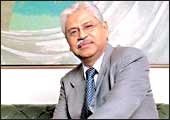 |
By acquiring Novelis, Bhattacharya
has given the group's globalisation strategy a huge shot in
the arm
Debu Bhattacharya
Managing Director/Hindalco |
Till yesterday,
Hindalco was a company with one aluminium smelter, a couple of alumina
refineries and rolling mills, an extrusion plant, a foil plant and
a string of memoranda of understanding to put up new smelting and
refining capacities. All these proposed and existing capacities
are, of course, domestic. One fine day, after a year of negotiations
and plenty of prodding from investment bankers, Kumar Mangalam Birla,
Chairman, Aditya Birla Group (of which Hindalco is a part), wakes
up to discover he's now got plants located in 34 locations that
are spread over four continents and 11 countries. Birla has reason
to be contended with the development-and with his core team that
spearheaded this transaction, which includes Debu Bhattacharya,
Managing Director, Hindalco, and Sumant Sinha, Group CFO. By taking
over Novelis, a world leader in aluminium rolled products-the deal
is expected to be completed by the first quarter of 2007-08 and
the acquisition needs the approval of at least two thirds of Novelis'
shareholders-Hindalco has taken a giant stride on the global stage.
This clearly is the Aditya Birla Group's largest
acquisition on international shores-and the second-largest by
an Indian company after Tata Steel's buyout of Corus-but it isn't
as if going global is a new phenomenon at this group, whose roots
date back to the 19th century. Way back in 1969, when the late
Aditya Birla was just 24, he set the group's global agenda at
a time when few promoters were even thinking about it. In the
years ahead, he set up some 19 companies outside India in countries
like Thailand, Malaysia, Indonesia, the Philippines and Egypt.
By acquiring Novelis, Birla has given the group's globalisation
strategy a huge shot in the arm.
 |
He set up some 19 companies outside India in
countries like Thailand, Malaysia, Indonesia and Egypt
Aditya Birla
Died in October 1995 |
The deal should have also come as a shot in the
arm for the share price of Hindalco, which has been languishing
for some time now. In absolute terms, it's fallen 9 per cent over
a year, and relative to the Sensex it's down 35 per cent. If the
transaction was expected to provide some respite in the short term
to the stock, exactly the opposite took place: A day after the deal
was announced, the Hindalco share plunged 13.74 per cent, and at
the time of writing the stock was down 12.55 per cent from its price
before the announcement. A $6 billion (Rs 26,400 crore) price tag
(debt included) for Novelis combined with a complex funding mechanism
spooked the markets, with a section of analysts dismissing the deal
as a value-destroyer.
It isn't as if the deal doesn't have some compelling
reasons. The acquisition is complementary to Hindalco given its
own strengths in the upstream business where it is a very large
player. The deal gives it access to the global market and, in
one stroke, will add close to 3 million tonnes of downstream aluminium
facility. Besides, there is the advantage of Hindalco being a
low-cost aluminium producer. Novelis will be in a position to
source this which will reduce its own production costs and make
it more cost-competitive. "Hindalco is a global leader in
aluminium and the proposed transaction provides compelling benefits
for both Novelis and Hindalco. It is in line with our strategy
to expand our involvement in downstream aluminium markets,"
says Birla. The transaction, hence, provides a combination of
access to geographies and a large customer base. "The acquisition
for Hindalco offers an opportunity to scale up globally,"
says Rajeev Gupta, Managing Director and Head of Carlyle's India
buyout team.
| THE ROUGH WITH
THE SMOOTH |
| Novelis brings value, but creating
shareholder value won't be easy. |
| Pluses
Access to global markets which will make Hindalco an international
player
Addition of 3 million tonnes of down stream aluminium
facility
Hindalco can supply aluminium to Novelis at low costs
resulting in significant cost reduction overall
Novelis' clientele includes big names like Coca-Cola,
General Motors and Ford
Minuses
Over $2 billion will be borrowed which will be a big debt
burden
Margins could be under pressure when aluminium prices
start increasing
Novelis, in spite of accounting for a fifth of the global
rolled aluminium capacity, is said to have limited pricing
power
Novelis made a loss of $170 million for the first nine
months of 2006 and it could take a while to turn the company
around |
A comparison with Tata Steel's acquisition
of Corus is almost inevitable. Both are multi-billion dollar deals
involving large business houses from India. Besides, both the
transactions are looking at grabbing the advantage of being low-cost
producers which will facilitate shipping products from India.
Agrees Jitesh Gadhia, Managing Director, ABN Amro, one of the
lenders to Hindalco, who points out that there are synergies for
the buyers in both cases. "There is some similarity in the
industrial rationale between the Tata Steel-Corus and Hindalco-Novelis
deals as far as vertical integration is concerned. Both buyers
have visible upstream strengths and they will now be able to complement
this with high-quality downstream operations in western markets,"
Gadhia told BT.
The Concerns
There's little doubt about the long-term benefits
of the transaction and its ability to create value for Hindalco
shareholders by shipping primary aluminium to Novelis that's produced
at a much lower cost than that of global competitors. It's, however,
the potential short-term damage the deal can wreak that's worrying
analysts and investors. Consider: The enterprise value of $6 billion
has $2.4 billion (Rs 10,560 crore) by way of debt, with Hindalco
forking out the rest in an all-cash transaction. That may be too
high a figure to be comfortable with. "The acquisition price
for Novelis is at a 100 per cent premium to Novelis' 2006 average
price and at a 57 per cent premium to the last three months' average
price," says foreign brokerage firm CLSA in a report following
the announcement of the deal. CLSA places an "underperform"
on the Hindalco stock at a price point of Rs 149.40.
| FUNDING A MEGA-DEAL |
| There's tonnes of debt. |
Details In $ million
Cash from the treasury of Hindalco 450
Borrwings from Essel Mining & Industries (an Aditya Birla
Group company) 308
Debt that will be raised by an SPV of Hindalco to be incorporated
in Canada 2,800
Existing debt on Novelis' balance sheet that Hindalco will
take over 2,400
Total enterprise value 5,958 |
Then there's the big mountain of debt which, fear
analysts, could affect future cash flows. Ratings agency, Fitch
has placed Hindalco's ratings on negative. CLSA, in its report,
points out that for the year ended March 2006, Hindalco had over
$800 million (Rs 3,520 crore) in cash and equivalents. "Hindalco
has free cash flows of $770-870 million (3,388-3,828 crore) over
the next two years but post capex cash flows are negative,"
it adds. Novelis' financials too are hard to ignore and the company,
for the first nine months of 2006, had a loss of $170 million
(Rs 765 crore) on revenues of $7.4 billion (Rs 33,300 crore).
"The valuation depends on the intrinsic
capability of an asset," rationalises Sunirmal Talukdar,
CFO, Hindalco. He points out that it would have taken Hindalco
at least 10 years to create that kind of capacity on the downstream
front. "The acquisition is a good strategic fit and the way
we see it, there is a lot of upside potential in aluminium as
a commodity," adds Talukdar. He speaks of areas like transportation,
architecture, packaging and pharmaceuticals which will be big
markets in the future for aluminium.
| MANY IRONS IN
THE FIRE |
| For Kumar Mangalam Birla, the last few years
have been packed with action in the main businesses that include
cement, telecom, textiles, IT and IT-enabled services, financial
services and metals. In cement, the Aditya Birla Group is
among the largest players with a total capacity well in excess
of 30 million tonnes. The acquisition of L&T's cement
division in 2003-which was subsequently renamed UltraTech
Cement-has seen the group becoming very strong in that sector.
Idea Cellular is set to be listed on the bourses. The company
which operates in 11 circles should be operational in Mumbai
and Bihar by the end of 2007 and is eventually looking to
be a large pan-India player. With valuations in the sector
on a high, Idea Cellular seems to be well-placed to ride the
boom. Likewise, the IT/ITES story too is gaining ground. Starting
off with relatively smaller acquisitions like PSI Data Systems
and Transworks, the Aditya Birla Group has emerged stronger
after buying out Canadian BPO, Minacs. Garments, where the
group has brands like Van Heusen and Louis Philippe, is a
competitive segment and has a host of players. Given that
this business has a strong retail network, Birla will find
this handy when it comes to launching his much-talked about
retail foray. To be launched under a new company, Aditya Birla
Retail, the retail business is said to be ready to get off
the blocks over the next 6-9 months. Birla has already announced
his intentions by buying over Trinethra's chain of over 170
outlets spread across southern India. That acquisition has
given the group ready access to the business which promises
to be among the most competitive in the years to come. Insurance
has been a bit slow though Birla intends to be a big player
in the financial services business. With low levels of penetration
and a large population, there seems to be space for many more
players. With Birla Global Finance and Indo-Gulf Fertilisers
having merged into Aditya Birla Nuvo-earlier called Indian
Rayon-Birla is clear that the conventional businesses will
slowly become less important. With sectors like retail and
telecom, Birla is sure to make huge investments in these businesses.
That apart, he is sure to look at other business opportunities
as well. |
 |
"The valuation depends on the intrinsic
capability of an asset"
Many Irons in the Fire
Sunirmal Talukdar
CFO/Hindalco |
But servicing the debt and the loss of other
income, according to analysts, will be around $250 million (Rs 1,100
crore) per annum. Will Hindalco be able to wring out adequate earnings
from Novelis to keep its head above water? "We know the interest
outgo. In the manufacturing sector, EBITDA (earning before interest,
tax, depreciation & amortisation) is key and our focus will
be on that," says Talukdar. What also augurs well for the transaction
is the expiry of price ceilings on Novelis' products. One look at
Novelis' financial numbers for the nine month period of 2006 indicates
that a loss of $170 million (Rs 748 crore) was incurred on account
of the company having a ceiling on the price of its products. It
is estimated that these contracts accounted for around 20 per cent
of Novelis' sales. Importantly, from January 2007, around half of
these contracts with the price ceiling have expired. The ceiling
on the other half will expire by 2009-10 and Novelis, apparently,
will not accept any new contracts with a price ceiling clause. That
should augur well for the company's financials. Analysts expect
Novelis to enter the black in 2007 and 2008 pretty convincingly.
The big picture that Birla sees is an entry into
the Fortune 500 list for Hindalco three years ahead of plan-the
original target was for 2010. "Acquisitions are not geography
dependent. They depend on value-creation and will have to be in
sync with existing businesses," says Birla, who's clearly
following in his father's footsteps. Unlike the seventies and
the eighties (during that time Aditya Birla built his empire),
the current global environment has never ever been as conducive
for Indian business. That would explain the larger scale of the
younger Birla's ambitions when compared with those of his father.
The intent, though, is similar: To be truly global, and not just
geographically. With Novelis, though, Birla and his team will
have to use all their skills to get the best possible value out
of it. The world is closely watching this one
|







